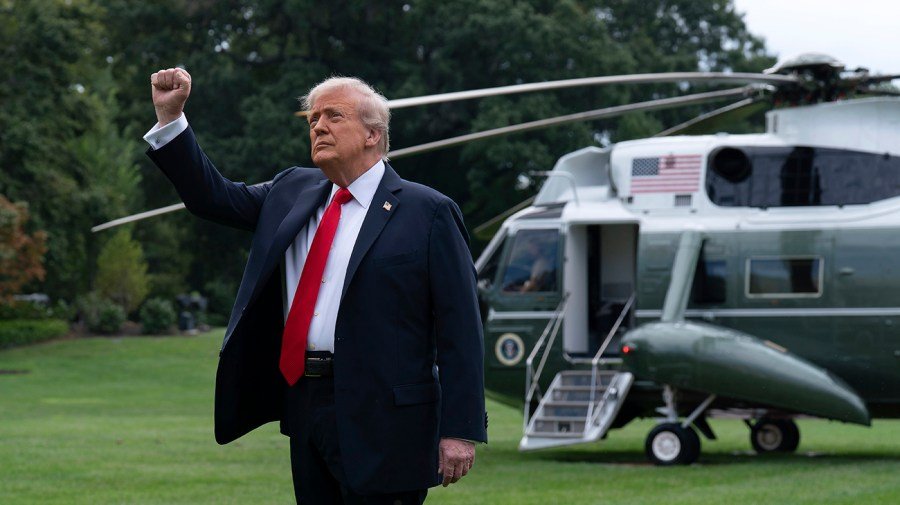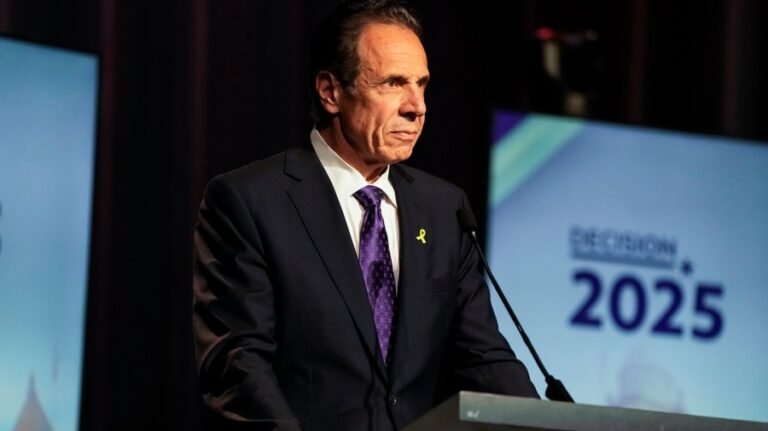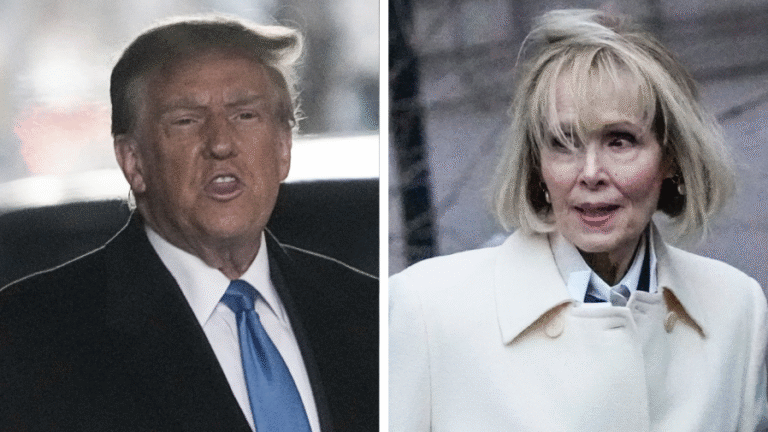
Morning Report is The Hill’s a.m. newsletter. Subscribe here.
In today’s issue:
▪ Chicago braces for ICE enforcement
▪ Congress looks for shutdown workaround
▪ Trump lauds RFK Jr. amid CDC, vax uproar
Is President Trump about to send troops and federal officers to Chicago?
The president this weekend signaled the long-reported Chicago federal force was coming, alarming local officials on Saturday with a social media post that imposed Trump’s face on Robert Duvall’s in an “Apocalypse Now”-like scene with Chicago’s skyline in the background.
Yet Trump on Sunday said a decision on what’s next for the crime crackdown is still under discussion.
“We’re going to make a decision about where we’re going to go in the next day or two,” he said while insisting he’s not the one talking about Chicago — it is his political opponents.
White House immigration czar Tom Homan said Sunday that Chicago and other “sanctuary cities” should “absolutely” expect federal immigration enforcement actions this week. Interviewed on CNN, he said Illinois officials have been aware of Immigration and Customs Enforcement (ICE) operations in Chicago since early this year.
It’s easy to see why Chicago and Illinois officials — and Democrats across the country — would see Trump’s social media post as a threat to the Windy City.
“Chicago’s about to find out why it’s called the Department of WAR,” Trump’s post said.
And this a day after Trump officially said the Defense Department will now be known as the War Department to better reflect its mission.
But his remarks Sunday to reporters were a bit less threatening, as he cast any action in Chicago as less a military offensive and more a plan to “clean up our cities … so they don’t kill five people every weekend. That’s not war. That’s common sense.”
▪ CNN: Here’s how Chicago is bracing as possible National Guard deployment looms.
Trump’s controversial federalization of domestic law enforcement, including ICE arrests, involves operations in Boston, a National Guard deployment in the nation’s capital since Aug. 11 and Trump’s renewed criticism of Portland, Ore.
The president’s vows to send armed federal troops and law enforcers to roam big-city streets, applauded by his base but criticized by many Americans, involves locations led by Democrats in blue states in which governors are seen as potential 2028 presidential candidates.
A CBS News poll released Sunday found people who live in cities generally oppose sending troops to other cities. Opinions are also tied to partisanship: 89 percent of Republicans said they think deploying the National Guard to cities reduces crime while 86 percent of Democrats say it doesn’t.
A majority of Americans say they are opposed to Trump’s crime crackdown and believe he’s motivated by politics more than crime prevention, according to the poll. To those in favor, largely in Trump’s base, it’s not a case of red-versus-blue cities. They’d support the National Guard being sent to either Democratic- or Republican-led locations and say they’d welcome the Guard in their own local areas.
The president has been accused of trying to shift public attention away from a weakening U.S. economy and to divert some in the GOP from the Jeffrey Epstein saga to try to paint the minority party as soft on public safety, policing, border security and justice — issues on which Trump led during his 2024 presidential campaign.
Democratic officials and party operatives are split about the political utility of attacking the accuracy of Trump’s urban crime statistics versus challenging him to work with Democratic mayors and governors to thwart violent crime — putting White House muscle behind policies they think are effective, such as community policing, adding resources to hire additional police and reinforcing violence intervention programs focused on crimes perpetrated by gangs and teens. Democrats also favor tougher gun laws, which Trump opposes.
Rahm Emanuel — a former Chicago mayor and former top White House official under Presidents Bill Clinton and Barack Obama who has himself been mentioned as a possible presidential candidate in 2028 — suggests Trump may not gain the political traction he seeks using the National Guard.
“Every city is facing a challenge on [police] recruitment; help there,” Emanuel rhetorically advised Trump during a “Hacks on Tap” podcast before Labor Day with fellow Democratic strategist and Chicagoan David Axelrod. “Invest in license plate readers so you can deal with carjacking. Invest in after-school programs for kids,” Emanuel added, noting National Guard deployments are not a sustainable, long-term urban policy.
Trump “is making himself the focal point of the disorder, and people do not like that dissonance and disorder,” he added.
Washington, D.C., Mayor Muriel Bowser (D) this weekend juggled criticism amid public confusion about her stated intention to cooperate with Trump’s federalization of law enforcement in the nation’s capital. “What I care about is protecting this city, our home rule and preserving our autonomy at every step,” Bowser said.
Washington, unlike Chicago and other major metro areas, is a federal district, not a state. It has 700,000 residents.
It’s unclear if the president’s 30-day emergency control of D.C.’s police department will expire on Wednesday as scheduled.
National Guard and Marine troops sent by Trump into Los Angeles in June rotated out a month later amid legal challenges filed by California Gov. Gavin Newsom (D). The president has been jousting with Illinois Gov. JB Pritzker (D), who assailed Trump on Saturday as a “wannabe dictator.”
Illinois Sen. Tammy Duckworth (D) told CBS’s “Face the Nation” on Sunday that Trump “essentially just declared war on a major city in his own nation,” referring to his Saturday post and remarks to reporters about Chicago. But she conceded she had no “indications” the administration was poised to send troops into the nation’s third-largest city.
Sen. Dick Durbin (D-Ill.), speaking during a Saturday parade near Chicago to celebrate Mexican Independence Day, told constituents Trump’s social media post referencing “war” in Chicago was “disgusting” and “an embarrassment.”
Other flashpoints in Trump’s ramped-up ICE enforcement continue to play out elsewhere in the country.
In Georgia, 475 people, most of whom were South Korean nationals detained by ICE last week at a Hyundai factory, will be repatriated to South Korea after the administration and the South Korean government reached an agreement over the weekend. Trump on social media on Sunday said international companies need to hire and train American workers at factories they build in the U.S. The raid was a result of a monthlong investigation into illegal hiring at the site, where Hyundai has teamed up with LG Energy Solution to manufacture batteries to power electric vehicles.
Smart Take with Blake Burman
While the renaming of the Department of Defense to the Department of War received a lot of attention and headlines last week, President Trump over the weekend continued to keep foreign policy in the forefront. When asked if he was considering attacking cartels inside of Venezuela, the commander in chief responded by saying, “Well, you’re going to find out.”
Trump is known for sticking to a public line that all options are on the table, and that answer certainly mirrors the sentiment. However, the comments also come just days after the military took out a Tren de Aragua-operated boat from Venezuela carrying drugs. The U.S. is also staging fighter jets in Puerto Rico.
Much of the foreign policy issues before the president so far in his second term have been halfway around the world (Iran, Russia/Ukraine and the Middle East). Now, there’s a new location for the president, and it’s a lot closer to home. As he says, we will soon find out where he chooses to go from here with Venezuela.
Burman hosts “The Hill” weeknights, 6p/5c on NewsNation
3 Things to Know Today
1. Treasury Secretary Scott Bessent is “confident” the Supreme Court will uphold Trump’s tariffs. Tariffs are not a tax on American consumers, he said on Sunday.
2. It’s the toughest time in years to be searching for work in America.
3. The American Heart Association has some new guidance about blood pressure. Here’s what to know.
Leading the Day

SHUTDOWN WATCH: Congressional leaders are trying to de-escalate a standoff over the Sept. 30 government funding deadline, with both Republicans and Democrats signaling they’d be open to a 45-day or possibly longer “clean” stopgap that would not include substantial funding cuts.
Democrats are trying to keep the path open to a bipartisan deal to avoid a government shutdown by saying privately they are not going to draw a red line against Trump’s $5 billion pocket rescission in the spending talks, writes The Hill’s Alexander Bolton.
Instead, they’ll let the courts handle Trump’s attempt to sidestep Congress by rescinding funding unilaterally. But Trump remains a wild card.
If he inserts demands into the negotiations that Democrats can’t accept, Senate Minority Leader Chuck Schumer (D-N.Y.) and House Minority Leader Hakeem Jeffries (D-N.Y.) are ready to hold the line, even if it means a shutdown.
“Schumer has come around to the viewpoint of telling Republicans that partisan [funding patches] are dead on arrival,” said one Democratic senator.
House Democrats argue the political environment has changed so drastically over the past six months that Schumer has almost no choice but to oppose a GOP spending bill negotiated without Democratic input.
“The world has literally changed since that occurred,” said Rep. Donald Norcross (D-N.J.). “He made a calculated risk and it did not turn out well. I don’t think he’ll make that mistake twice.”
▪ NOTUS: Democrats say Republicans aren’t taking them seriously on government funding.
▪ Politico: A new bipartisan bill aimed at curbing member stock trading would allow lawmakers to reinvest their market holdings tax-free.
SENATE NOMINEES: Senate Republicans are growing increasingly frustrated after a series of Trump’s nominees tapped to key posts were ousted or exited after only a short stint in office, leaving lawmakers scratching their heads after they poured considerable time and effort into their confirmations.
At least five such people have departed for various reasons, but a majority have left after dust-ups with key administration officials. Former Centers for Disease Control and Prevention (CDC) Director Susan Monarez and ex-IRS Commissioner Billy Long serve as prime examples.
Meanwhile, Republicans say they may change Senate rules as soon as this week to confirm Trump’s nominees en masse, NOTUS reports.
“Amy did this in 2023,” said Sen. Markwayne Mullin (R-Okla.), referencing Sen. Amy Klobuchar’s (D-Minn.) proposal to push 10 nominees through at once. “I mean, it’s dang near the exact same language, except we may not put a limit of 10. We may put unlimited on there.”
EPSTEIN ISSUE: The “Epstein Files” explosion on Capitol Hill last week — headlined by emotional accounts from Epstein’s and associate Ghislaine Maxwell’s accusers — fueled hopes of more disclosures. But opposition from the Trump administration and political realities in the Senate could thwart that effort.
The dynamics have laid the groundwork for an explosive fall as the issue accelerates back up to full throttle.
Democrats are unanimously supporting an alternative effort led by Reps. Thomas Massie (R-Ky.) and Ro Khanna (D-Calif.) to use a procedural gambit known as a discharge petition to bypass GOP leadership and force a vote on their bill that directs the Department of Justice (DOJ) to release virtually all information relating to Epstein.
“The DOJ and government are implicated in this, too,” Massie said. “You can’t trust them. You can’t let them curate all of the evidence that implicates the DOJ and their best friends.”
▪ The Washington Post: Conspiracy theories helped elect Trump. Now he can’t shake them.
▪ NBC News: The Justice Department on Friday asked a federal judge overseeing the Epstein case to deny a request from NBC News to unseal the names of two associates who received large payments from him in 2018.
When & Where
The president will deliver remarks shortly after 10 a.m. to the White House Religious Liberty Commission at the Museum of the Bible in Washington.
The House will convene at noon.
The Senate will meet at 3 p.m.
Zoom In

PLAYING DEFENSE: Trump on Sunday defended Health and Human Services (HHS) Secretary Robert F. Kennedy Jr., who has faced increasing criticism from both sides of the aisle on Capitol Hill over his handling of vaccines and staffing at the CDC.
Trump has given somewhat conflicting messages over the last several days about Kennedy, defending his Cabinet member while also defending vaccines, including those for polio and COVID.
“He’s a different kind of a guy. He’s got a lot of good ideas, but he’s got a lot of ideas,” Trump told reporters outside the White House.
“You know, normally, they don’t have any ideas and that’s why we have problems with autism and so many other things, because we’re coming up with the answers for autism, you watch,” Trump continued. “We’re coming up with the answers for other things that normal people, regular people, easy-to-get-along-with people wouldn’t be able to do.”
AUTISM: Kennedy plans to announce in an upcoming department report that Tylenol taken during pregnancy and low levels of folate, an important vitamin, are potentially linked to autism, The Wall Street Journal reported Friday. HHS has called the Journal’s story “speculation.”
Kennedy has in the past made the unfounded claim that autism is a “preventable disease,” a statement criticized by many medical experts. Autism has become more prevalent in children born in the U.S. over the past 25 years, according to CDC statistics. But there is no scientific consensus on the reasons why.
SENATE GRILLING: Kennedy, a longtime vaccine skeptic, has come under fire for his rollback of COVID-19 vaccine authorization. According to a new NBC News poll, nearly 8 in 10 Americans support using vaccines to prevent diseases, including 49 percent who strongly support them.
On Sunday, Kennedy decried his intense grilling last week by a panel of senators over major shake-ups at the top health agencies as “theater.”
“I’ve come to realize that those hearings are performative. They’re theater,” he told “Fox & Friends” on Sunday. “They’re not the kind of debate or open conversation that democracy would give us at its ideal.”
Without citing evidence, Kennedy said the senators “don’t want to hear the answers to the questions that they ask me. They want to make a little speech and then shut me down.”
▪ The New York Times: By promoting suspicions about the institutions he oversees, critics say Kennedy is jeopardizing public health. He says he is pursuing transparency.
COVID-19 VACCINES: Blue states are quickly moving to defy Kennedy’s vaccine restrictions, increasing the likelihood of a patchwork of conflicting policies across the country. In Massachusetts, Gov. Maura Healey (D) announced health insurers will be required to cover vaccines recommended by its health department. Colorado and Pennsylvania have also cleared barriers that would have prevented pharmacies from providing broad access to the shots this fall.
New Mexico’s health department issued a public health order to ensure all residents can obtain the vaccines. And New York Gov. Kathy Hochul (D) plans to authorize pharmacists to provide the COVID-19 vaccine to almost anyone who wants it without a prescription.
▪ The Hill: Democrats are jumping into the fray to voice their disapproval about Kennedy and the broader debate on rolling back vaccines. But after the public pushback around COVID lockdowns and vaccines on the heels of the coronavirus pandemic, some are urging restraint.
REDISTRICTING: Utah may be the next state to redraw its congressional lines amid a growing redistricting battle across the country. A judge ruled last month that legislators bypassed safeguards against partisan gerrymandering with the latest map and must redistrict before the midterms. The ruling may face additional legal challenges, but both sides of the case reportedly agreed this week on a timeline that could make changes as soon as this fall.
Unlike redistricting efforts in Texas and California, where plans were put forward to boost party margins in the House, Utah would be forced to redraw by the court order. Experts told The Hill’s Julia Mueller that new maps could offer a rare opening for Democrats in the ruby-red state.
A LOSING BATTLE: Red-state Democrats in Indiana, Ohio and Missouri are staring down a national redistricting battle that offers them few good options to counter GOP efforts in their states. Democrats in the three Midwestern states don’t have the numbers needed to deny Republicans a quorum — or meaningfully halt potential legislation for long.
“My job for the last several weeks has been to constantly explain to people why we’re going to lose this fight. That is a deeply demoralizing position to be in as a leader,” explained Missouri House Minority Leader Ashley Aune (D). “Just being able to know that there are other folks out there going through the same thing, who are also having difficult conversations with their caucus members and their communities — sometimes it just helps to know that you’re not alone.”
▪ The Hill: Sen. John Cornyn (R-Texas) appears to be closing the gap in his contentious primary race against Texas Attorney General Ken Paxton (R), who was leading in most polls only a few months ago.
▪ The Hill: Maryland Gov. Wes Moore (D) replied “yes, I’m not running” when pressed on NBC’s “Meet the Press” if he has ruled out a presidential bid in 2028.
▪ The Wall Street Journal: Chinese hackers last summer pretended to be Rep. John Moolenaar (R-Mich.), chair of the House Select Committee on the Strategic Competition Between the United States and the Chinese Communist Party, during trade talks. The FBI is investigating.
Elsewhere

UKRAINE: Trump said he was “not happy” after Moscow hit Kyiv with its largest drone attack since the war began, underscoring his administration’s failure so far to reach a peace deal even after his meeting with Russian President Vladimir Putin last month.
“I’m not happy, I’m not happy about the whole situation,” Trump told reporters on Sunday after landing at Joint Base Andrews.
Trump has in recent weeks grown increasingly frustrated with Putin, who despite appeals from the White House has slow-walked any attempts at a peace deal.
Russia on Sunday attacked Ukraine with the largest drone assault so far in the war. The strike damaged a key building in Kyiv’s heavily guarded government district for the first time since the start of the full-scale invasion in 2022 and killed at least four people.
“Such killings now, when real diplomacy would have started long ago, are a deliberate crime and a prolongation of the war,” Ukrainian President Volodymyr Zelensky said in a statement. He called for sanctions and for strengthening Ukraine’s air defenses.
Trump, meanwhile, told reporters that European leaders would be visiting the White House early this week, as he repeated expectations that he will talk “soon” with Putin to end the war in Ukraine.
But Zelensky told ABC News on Friday that Trump’s summit with Putin in Alaska gave the Russian leader what he wanted.
“It’s a pity that Ukraine was not there, because I think that President Trump gave Putin what he wanted,” Zelensky said. “He had — he wanted, you know, he wanted very much to meet with President Trump, with the president of the United States. And I think that, and I think that Putin got it. And, it’s a pity.”
▪ BBC: Trump threatens tougher sanctions after Russia’s heaviest strikes on Ukraine.
VENEZUELA: The White House is weighing options to carry out military strikes against drug cartels in Venezuela. CNN reports the plans include potential targets inside the country as part of a broader strategy aimed at weakening leader Nicolás Maduro.
The deliberations resulted in last week’s deadly strike on an alleged drug boat departing Venezuela, marking a significant escalation in the Trump administration’s campaign against drug cartels. The White House has faced criticism for the strike, and concern about what, if any, legal justification the administration had for the operation.
Senate Intelligence Committee Vice Chair Mark Warner (D-Va.) told CBS News’s “Face the Nation” on Sunday that the committee was not briefed ahead of the deadly strike.
“What I’m worried about is if we put our sailors in harm’s way by violating international law, unless there is the appropriate designations, could this come back and hurt those sailors?” he said. “Sailors were doing their job.”
Vice President Vance over the weekend defended the attack.
“Killing cartel members who poison our fellow citizens is the highest and best use of our military,” Vance posted to the social platform X on Saturday morning.
‘LAST WARNING’: Trump on Sunday posted on Truth Social he is issuing his “last warning” to Hamas to accept a hostage and ceasefire deal in Gaza.
“Everyone wants the Hostages HOME. Everyone wants this War to end! The Israelis have accepted my Terms. It is time for Hamas to accept as well. I have warned Hamas about the consequences of not accepting. This is my last warning, there will not be another one,” the president wrote.
His comments on social media come just days after he told reporters the White House is “in very deep negotiations with Hamas” to secure the release of the remaining Israeli hostages. Axios reports White House envoy Steve Witkoff has sent a new proposal to Hamas for a Gaza hostage and ceasefire deal through an Israeli peace activist. The new U.S. proposal aims to find a diplomatic solution ahead of Israel’s planned offensive to occupy Gaza City.
▪ Reuters: The window to stop famine from spreading through Gaza is “narrow,” a top United Nations official said Saturday, calling on Israel to allow unimpeded aid delivery in the territory.
▪ CNN: At least five people were killed and several injured in a shooting in Jerusalem on Monday morning.
▪ BBC: Israel’s Supreme Court ruled that the state is failing to provide adequate food to Palestinian prisoners.
Opinion
A Senate confirmation fast lane? by The Wall Street Journal editorial board.
The tennis Grand Slams sell women short in three sets, by Diana Nyad, opinion contributor, The Washington Post.
The Closer

And finally … 🎾Carlos Alcaraz, 22, needed just 2 hours and 42 minutes to defeat Jannik Sinner, 24, in the U.S. Open men’s championship on Sunday, 6-2, 3-6, 6-1, 6-4. They were the first two men in the sport’s history to face each other in three consecutive Grand Slam finals within a single season.
“I’m seeing you more than my family,” Alcaraz joked during the trophy ceremony, eliciting a grin from Sinner. “It’s great to share the court, to share the locker rooms, everything.”
Alcaraz from Spain leads Sinner from Italy by 10-5 in their head-to-head series, 6-4 in total Grand Slam trophies and 2-1 in their U.S. Open championships, ESPN reported.
Aryna Sabalenka on Saturday won her second consecutive U.S. Open women’s championship, dispatching Amanda Anisimova of the United States in straight sets, 6-3, 7-6 (3). With her victory, Sabalenka, of Belarus, became the first woman to earn consecutive U.S. Open titles since Serena Williams won three straight from 2012-14.
Trump watched the men’s championship from the Rolex box at USTA Billie Jean King National Tennis Center in New York to a smattering of boos and cheers on Sunday.


